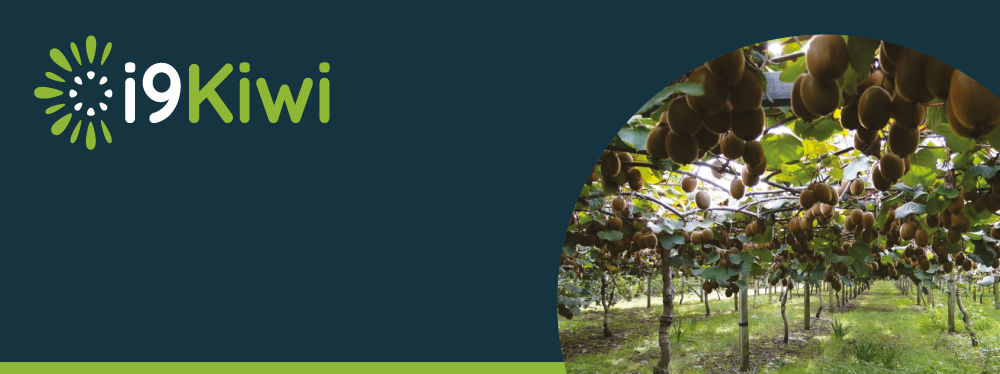I9K
Desenvolvimento de estratégias que visem a sustentabilidade da fileira do kiwi através da criação de um produto de valor acrescentado
Desafio
O I9K pretende responder aos desafios da Fileira do Kiwi através da criação de um grupo de excelência que adotará estratégias inovadoras e práticas agrícolas geradoras de maior produtividade, potenciando a competitividade do setor em novos mercados.
Solução / Objetivo Principal
Neste contexto, os principais resultados a atingir no âmbito do i9K são:
• Mapeamento das principais regiões produtoras com base em fatores abióticos e bióticos. Implementação de programas que identifiquem as regiões mais vulneráveis com base na previsão dos efeitos diretos e indiretos de fatores abióticos e bióticos;
• Métodos de mitigação e controlo da Psa através do uso de antagonistas com possibilidade de serem utilizados em contexto real;
• Métodos de mitigação e controlo da Psa no pólen com possibilidade de serem utilizados em contexto real;
• Métodos que potenciem o sistema imunitário da planta com possibilidade de serem utilizados em contexto real;
• Identificação de reservatórios naturais de Psa cuja gestão será incluída no Manual Técnico;
• Identificação de variedades adaptadas aos condicionalismos edafo-climáticos das duas principais regiões produtoras, Entre Douro e Minho e Beira Litoral, com elevada capacidade produtiva e resistência/tolerância à Psa;
• Métodos de aplicação de pólen inovadores e adaptados ao contexto nacional (tamanho das parcelas, condições edafo-climáticas, pérgola vs cruzeta, etc).
Objetivos, Atividades e Resultados esperados / atingidos
I9Kiwi veio melhorar a competitividade do país, concentrando-se exclusivamente em atividades de produção primária da fileira do kiwi através de várias tipologias de inovação, incluindo a inovação de produtos e processos. O I9Kiwi reuniu as competências necessárias para preencher lacunas evidentes no sector fitossanitário e na qualidade e diversidade de cultivares e pólen associados a custos de produção elevados.
Resumo das atividades desenvolvidas:
• Diversidade Biológica das Populações de Psa.
Destina-se a caracterizar as populações de Psa presentes nos pomares portugueses C98que apresentam condições abióticas distintas (Norte e Centro de Portugal), representativas da diversidade climática a que a cultura está sujeita. No total, 1673 estirpes putativamente identificadas como Psa foram isoladas e posteriormente confirmadas. O biovar foi determinado e todos os isolados foram tipados utilizando a metodologia BOX-PCR e VTNR. Os resultados mostraram que as populações de Psa nos pomares portugueses são heterogéneas. Tal heterogeneidade foi encontrada em cada um dos pomares e entre os pomares. Além disso, a estrutura das populações de Psa variou ao longo do tempo na mesma planta.
• Avaliar a Diversidade Genética entre as diferentes Populações de Psa.
Determinados os genoma de seis estirpes de Psa isoladas de folhas sintomáticas de Actinidia chinensis var. deliciosa. Os valores médios da identidade nucleotídica foram superiores a 99% de semelhança com as estirpes de referência de Psa biovar 3. As diferenças genómicas encontradas entre estas estirpes confirmam a diversidade genética descrita para a população de Psa em Portugal.
• Genómica comparada permitiu encontrar diferenças entre estirpes de pseudomonas Syringae PV. Actinidiae Isoladas em Portugal.
Neste estudo, o genoma draft de seis isolados de Psa obtidos de folhas sintomáticas de Actinidia chinensis cv. deliciosa em pomares portugueses foi determinado para estimar os genes que constituem o genoma partilhado, o genoma acessório e o pangenoma. Tanto quanto sabemos, só existe um draft genome de uma estirpe portuguesa, a CRA-FRU 14.08 isolado em 2010 no primeiro surto de Psa em Portugal.
O genoma desta e de outras estirpes representativas das cinco populações de Psa foram utilizados para as análises de genómica comparada. Estas análises revelaram importantes diferenças entre as estirpes de Psa e entre estas e o primeiro isolado português CRA-FRU. Ferramentas de predição de ilhas genómicas permitiram antever a ocorrência de uma ilha de patogenicidade em duas estirpes e ilhas de resistência em quatro. Foi ainda confirmada a coexistência na mesma planta de estirpes com reportório de virulência diferente previamente descrita por outros autores. Estes resultados refletem uma clara diversidade intraespecífica nos isolados portugueses e um mecanismo de evolução e adaptação do genoma subjacente.
• A microbiota bacteriana foliar de plantas kiwis femininas e masculinas em estações distintas: avaliação do impacto de pseudomonas Syringae PV. Actinidiae.
Sabe-se que fatores abióticos e o género das plantas influenciam o resultado da doença. Cinquenta unidades taxonómicas operacionais bacterianas foram identificadas e atribuídas a cinco Phyla distribuídas por 14 famílias diferentes e 23 géneros. As folhas de plantas kiwis femininas e masculinas saudáveis partilham a maioria das populações bacterianas identificadas, que sofrem grandes alterações sazonais.
A presença de Psa induziu alterações profundas nas estruturas da comunidade bacteriana foliar, traduzidas numa redução da abundância relativa de géneros anteriormente dominantes que tinham sido encontrados em plantas saudáveis; nomeadamente, Hymenobacter, Sphingomonas, e Massilia spp. O impacto de Psa foi menos pronunciado na estrutura da comunidade bacteriana de plantas masculinas em ambas as estações.
• O microbioma cultivável da filosfera como fonte de soluções inovadoras para combater as doenças das plantas.
Um total de 455 isolados, agrupados por 135 grupos RAPD, foram distribuídos taxonomicamente por cinco classes e 58 espécies. Algumas das espécies isoladas correspondiam a populações identificadas pela metodologia independente de cultivo. Outras foram apenas identificadas através do esforço de cultivo. Em ambas as abordagens foram detetadas géneros já descritos como tendo o potencial de agir como antagonistas ou como promotores dos mecanismos de defesa da planta.
Foram identificadas 2 géneros e 3 espécies novas para a ciência que serão formalmente descritas e cuja potencial biopesticida será avaliado.
• A microbiota da filosfera de kiwi como reservatório para PGPB e controlo biológico para Psa.
Este estudo visou identificar potenciais antagonistas contra Psa e Bactérias Promotoras do Crescimento Vegetal (PGPB) a partir da microbiota naturalmente presente na filosfera do kiwifruit. Cento e vinte isolados bacterianos pertencentes a 23 géneros previamente descritos pela equipa foram testados para vários parâmetros, nomeadamente: solubilização de fosfatos, produção de sideróforos, produção de amónia e auxinas, com ênfase no ácido acético 3-Indole (IAA). Das estirpes testadas, 20 foram positivas para todos os parâmetros sugerindo que estas bactérias têm o potencial de integrar em soluções de base biológica para práticas de gestão mais sustentáveis. Entre todos os isolados testados, a bactéria Bacillus pumilus foi capaz de inibir o crescimento de Psa com a formação de um halo inibidor em torno da colónia com uma área de 228,17 mm2.
• Identificação, caraterização e actividade antagónica de bastérias isoladas de um pomar de kiwi sem Psa.
Os principais objetivos deste trabalho foram a identificação de biopesticidas microbianos para controlo das bactérias fitopatogénicas acima referidas e/ou de bactérias promotoras do crescimento das plantas (BPCP) isoladas de populações naturalmente presentes na filosfera de pomares de kiwi nacionais. Foi compilada uma coleção de cultura de bactérias endófitas e epífitas isoladas de cinco pomares localizados nas principais zonas produtoras de kiwi (Viana do Castelo, Guimarães, Albergaria-a-Nova e Montemor-o-Velho), contabilizando um total de 2331 estirpes. Destas, 975 apresentaram resultado negativo na análise molecular para a deteção de Psa.
• Desenvolvimento da plataforma I9Kiwi.
Um sistema de monitorização, composto por componentes de hardware e software, que será integrado de forma "simbiótica" para recolher o máximo de informação possível sobre os parâmetros condicionantes tanto da produção como das doenças associadas à cultura, tornando assim possível correlacionar os factores abióticos com as doenças e as taxas de produção. A aplicação terá também a capacidade de gerar alertas para uma melhor gestão por parte dos produtores.

Referência do projeto
PDR2020-101-031204Financiamento

Região de Intervenção
Valença, Guimarães, Mortágua, Montemor-o-Velho, Coimbra, Vila Verde, Santa Maria da Feira, Oliveira do BairroInvestimento Total
465.222,30Investimento do IPN
260.000,00Elegível Total
417.589,93Elegível do IPN
243.194,57Apoio Financeiro da UE - Total
313.193,77Apoio Financeiro da UE – IPN
182.396,17Duração
48 MesesData de Início
1 de Janeiro de 2017Data de Fim
31 de Dezembro de 2021Data de Aprovação
20 de Setembro de 2017Consórcio
Instituto Pedro NunesAPK - Associação Portuguesa de Kiwicultores
Universidade de Coimbra – Centro de Ecologia Funcional
Direção Geral de Alimentação e Veterinária
KIWICOOP - Cooperativa Frutícola da Bairrada
KIWI GREENSUN - Conservação e Comercialização de Fruta, S.A.
PMNI - Produção e Marketing do Noroeste, Produtos Hortofrutícolas Ibéricos, unipessoal, Lda.
KIWIS D’OURO, Lda
Fruverg, Lda
KIWI 1000, Lda
Actiglabro, Lda
Website
https://i9kiwi.ipn.pt/Palavras-chave
Kiwi;Actinídea;
Psa;
Cancro bacteriano da actinídea;
Pólen;
Cultivares;
Polinizadores;
Mitigação;
Caracterização biótica e abiótica.










